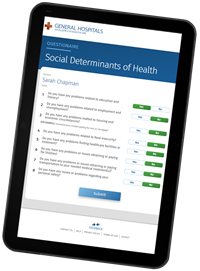
NEXT SDoH ONLINE UPDATE
2024 2Q - TBD
WE ARE HERE TO ASSIST YOU
SDoH requirements are increasing the workload of your existing teams. Our goal is to help your organization move quickly from education to adoption and include automation to address the added workload for the SDoH information collection, storage, and reimbursement activities.

Follow the next three easy steps to learn how to help your organization get started with this automated solution to enhance services to your patients, community, and employees.
STEP 1 - FAQ
What is SDoH?
Social determinants of health (SDoH) are non-medical factors that influence health outcomes. They include all the factors and conditions in which people are born, grow, work, live, age, and systems shaping the conditions of daily life. These factors include income, education, job security, employment, working conditions, childhood development, food security, health services, housing, gender, race, and disability. SDoH are one of three priority areas for Healthy People 2030, along with health equity and health literacy. Healthy People 2030 sets data-driven national objectives in five key areas of SDoH: healthcare access and quality, education access and quality, social and community context, economic stability, and neighborhood and built environment.
Centers for Medicare and Medicaid Services (CMS) started in 2023 requiring the collection of SDoH information. The data collection requirements continue to expand into 2024. Reimbursements for SDoH information collection are starting in 2024 which represent net-new revenue to healthcare organizations.
STEP 2 - Continuing Education
View the most recent SDoH update video to become informed about the latest SDoH developments. This video also contains content which offers much more than just guidance on asking SDoH questions and seeking reimbursement; it includes a wealth of additional information and resources.
(The next online update session is tentatively scheduled for early Feb 2024. Check back here for updates.)
STEP 3 - Get Started with Answers to SDoH Automation
You have questions, we have answers. Schedule a no-cost, no-obligation meeting with us. We will show you how you can easily:
- automate the process to classify and categorize SDoH information.
- automate the complexity of the G Codes and their corresponding CPT Codes and Z Codes.
- identify in your patient population the G Codes that have the highest needs and that your organization can easily start collecting reimbursements on.
- provide an instant list of local social resources to your Case Managment (CM) and Social Workes (SW).
- provide your billing team with instant reporting for SDoH reimbursements.
- gain real-time insights to how your organizations community funding dollars are impacting/improving community health initiatives.


